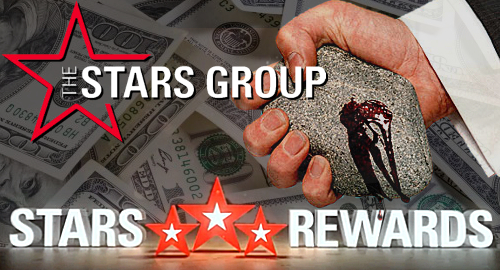 Online gambling operator The Stars Group (TSG) has managed the neat trick of achieving double-digit poker revenue growth without adding any more poker players.
Online gambling operator The Stars Group (TSG) has managed the neat trick of achieving double-digit poker revenue growth without adding any more poker players.
The Toronto-listed TSG released its Q3 earnings report on Thursday, which showed overall revenue of US $329.4m in the three months ending September 30, a 21.7% increase over the same period last year (constant currency growth was 16.8%). Adjusted earnings fared even better, rising 26.5% to $155.7m.
The parent company of PokerStars reported real-money online poker revenue rising 12.5% (7.5% in constant currency) to $221.4m, despite quarterly real-money active unique (QAU) customers remaining “virtually flat” from the same period last year at around 2m.
True, year-on-year comparisons are problematic, given Stars was forced to exit both Australia and Colombia during the quarter, although this Q3 did benefit from the site’s late-2016 return to Portugal, where it essentially holds an online poker monopoly, so give/take.
The poker gains were credited to the rollout of the company’s Stars Rewards loyalty program, which has led to increased engagement and enhanced cross-sell from poker to the site’s casino and sports betting offerings. The company says the controversial loyalty program has been adopted by around 85% of its players, although only around “two-thirds” of players have seen increased rewards as a result.
Combined real-money casino and sportsbook revenue came to $95.2m, up 48.3% year-on-year. These two verticals accounted for 28.9% of overall revenue, up from 23.7% in Q3 2016. Casino QAUs improved one-fifth to 553k while sports QAUs were up 14.8% to 273k.
Stars Group CEO Rafi Ashkenazi told analysts that the casino gains were in part due to a “very significant increase” in its live dealer business, thanks to new geographic expansion and higher yield per customer. The company still hasn’t ramped up direct marketing to boost its casino offering, and probably won’t until after the 2018 FIFA World Cup is finished.
The BetStars sportsbook has enjoyed some direct marketing expenditure and this will increase as the World Cup looms to boost direct customer acquisition. While cross-sell remains high, Ashkenazi said the sportsbook had developed a “relatively significant” player base independent of poker, and the ultimate goal was to establish both the casino and betting verticals as “standalone businesses.”
Ashkenazi said a key goal was boosting the sportsbook’s number of live betting markets and the company hasn’t ruled out acquisitions as a means of improving its sports product. Ashkenazi has identified a “few targets” for potential acquisitions, both in tactical and strategic terms.
As for Pennsylvania’s recent confirmation of its plans to launch an intrastate online casino and poker market, the company says it’s “still evaluating our options” in terms of striking a technology partnership with a local casino operator, or possibly acquiring an operator license of its own if the (currently) 12 available licenses in each vertical (poker, slots, table games) aren’t immediately snapped up.
Stars reconfirmed the FY17 guidance it issued in September, projecting revenues of between $1.285b and $1.315b and adjusted earnings of between $590m and $610m.